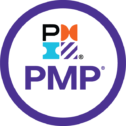Last updated on March-2024 by Nilotpal Ray, PMP
Which Certification is THE BEST for Project Management Career?
- Which is the best certification to go for if you are looking for a long-term career in project management?
- Should you go for a PMP or PRINCE2?
- Which certification would provide you the maximum chances for a job change or promotion?
- You are already a PMP. What certification can you do next?
If you are a professional in the field of project management for some time now (as a project support officer, project coordinator, assistant project manager, or project engineer)…some of the questions above may have crossed your mind time & again when you are thinking of building a long term career in project management:
In this article, we are going to talk about some advanced-level project management certifications which you can consider doing if you are looking for a long-term career in project management. Also, I will provide you with important tips & watch-outs on how to select the best certification suited to your career profile and interest to reap the maximum benefits.
As we all know, getting certifications is an expensive affair. Even if your organization is sponsoring the fees and you disregard the cost associated with the certification & training, you can’t disregard the significant amount of TIME & EFFORT you need to devote yourself to achieve it. Hence, you don’t want to end up pursuing the wrong certification!
So, let’s discuss the Top 5 Project Management Certifications that you should consider if you are planning a long-term career in project management. (if you are starting as a new project manager, please check out my article on Best Project Management Certifications for Beginners)
Project Management Professional (PMP®) Certification:
When it comes to advanced-level project management certifications, the first and the most valued one is the PMP® Certification.
This is the best-in-class and the most sought-after one by the entire project management fraternity.
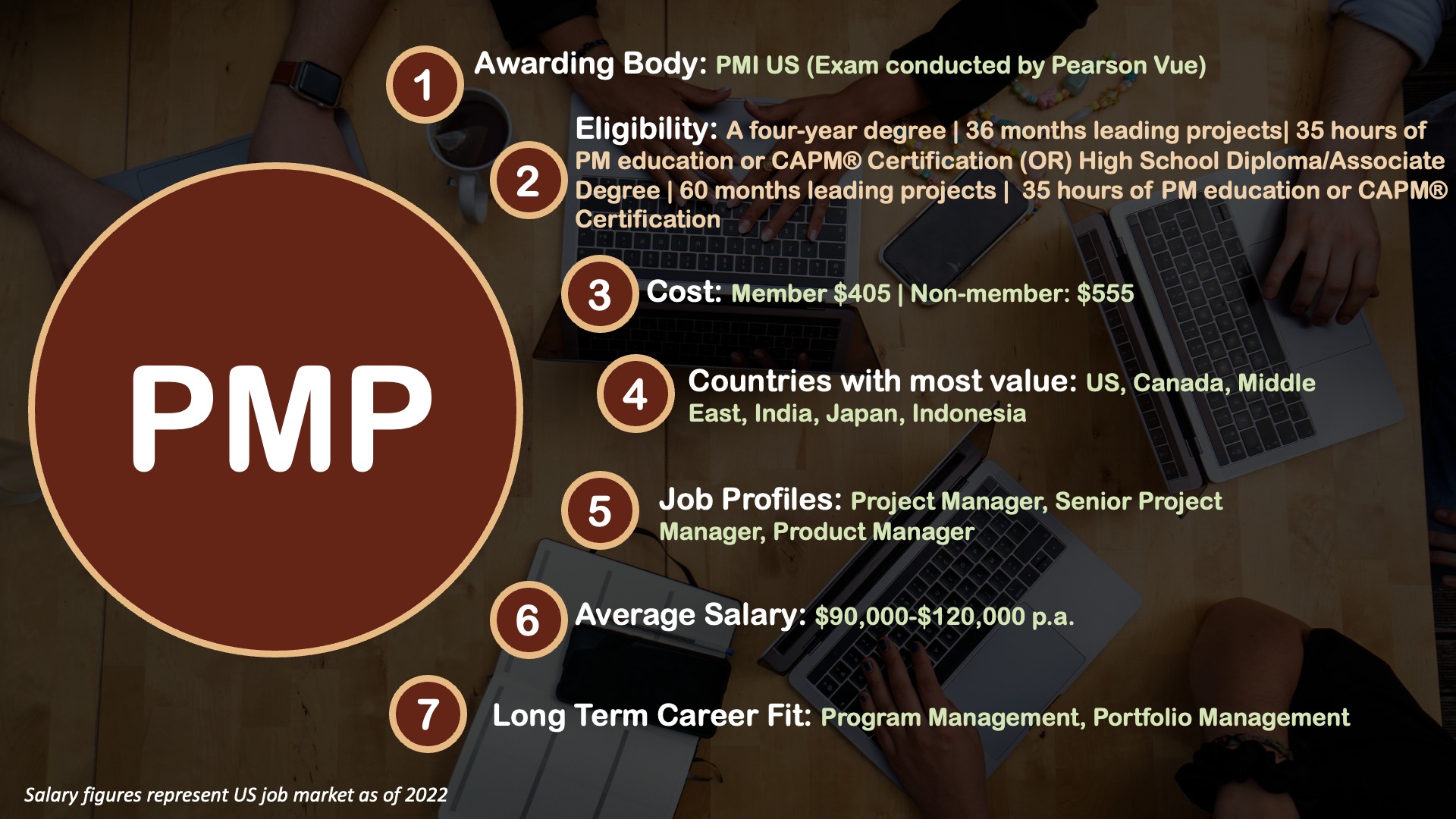

The infographic above highlights the most important items that you need to know if you are planning to pursue this Certification. However, I would like to highlight a couple of important pointers related to the PMP® Certification as below:
- PMP® is like the gold standard of certification in the project management industry and the beauty of this certification is that, it is not industry-specific. PMP is equally valued across different industries such as IT, FMCG, Banking, Telecom, Non-profit etc. This is one of the major advantages of getting the PMP certification. This certification provides you with a lot of flexibility to showcase your capability in project management across various Industries. This is highly unlikely in other certifications such as the PMI-ACP or the ITIL as these are more specific to IT and software development Industries.
- Secondly, the PMP exam is a tough exam and it is one of the most tricky and highly demanding project management exams in the industry. Therefore, you must prepare well for the exam so that you can pass it on your first attempt. To study for the exam, you can do self-study, take up online courses, watch tutorial videos on YouTube or enroll in an instructor-led course. You must choose what works best for you, but is very important that you do not underestimate the level of preparation and commitment that you need to have to pass the PMP exam.
Check out the official PMP Certification webpage here and if you are planning to write the PMP Exam, you can make the best use of the free resources on my YouTube channel PMPwithRay. Also, make sure you checkout my Udemy courses on PMP Certification as well.
PRINCE2® Practitioner Certification:
The next certification which you can consider if you are planning for a long term innings in project management is the PRINCE2® Practitioner certification.
It’s primarily a UK-based certification, offered by the organization called Axelos.
PRINCE2 stands for PRojects IN a Controlled Environment and this methodology is used a lot in UK and Europe to lead major IT and infrastructure development projects.
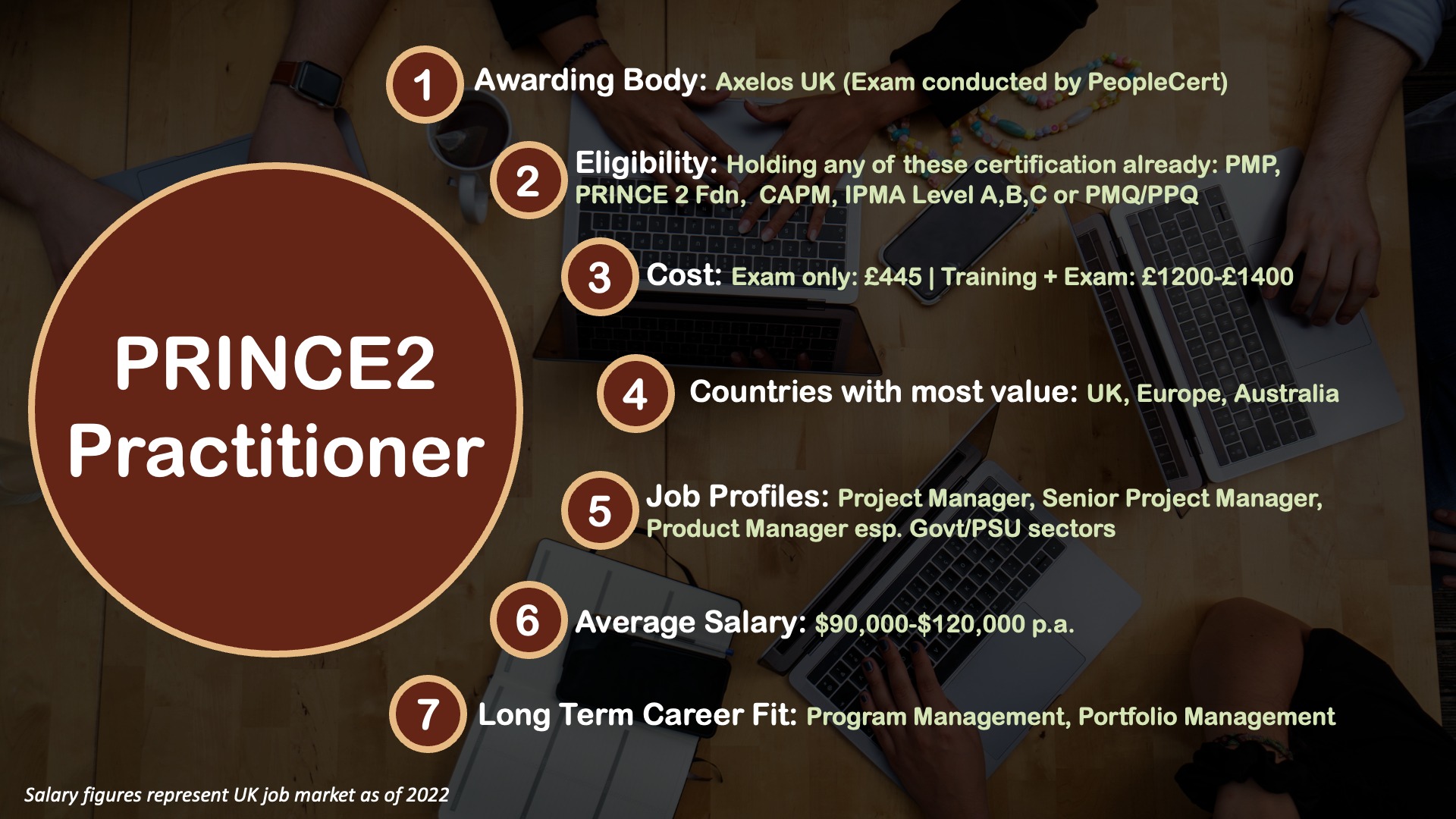

The infographic above highlights the most important items that you need to know if you are planning to pursue this certification. However, I would like to highlight a couple of important points related to the PRINCE2® Practitioner Certification as below:
- PRINCE2 has immense value in the UK, Europe and Australia. So, if you are based out of any of these geographical areas you should consider doing PRINCE2 certification rather than the PMP certification.
- If you study the job profiles in the UK, then you’ll see that PRINCE2 Certifications are highly valued in the government and public sectors. So if you are based in the UK and have similar aspirations of getting into a government job or public sector setup (NHS UK/TfL etc.) you should go for PRINCE2 Practitioner certification.
Check out the official PRINCE2 Certification webpage here and if you are planning to write the PRINCE2 Exam, you can check out my recommended courses on Edureka for PRINCE2 Certification training here.
PMI-ACP Certification:
The next certification which you should consider as an intermediate-level project manager is the PMI-ACP or the Agile Certified Practitioner Certification.
PMI-ACP will be extremely relevant to you, if you are a product manager or a scrum master or if you are managing Agile, extreme programming or DSDM (dynamic system development method) projects.
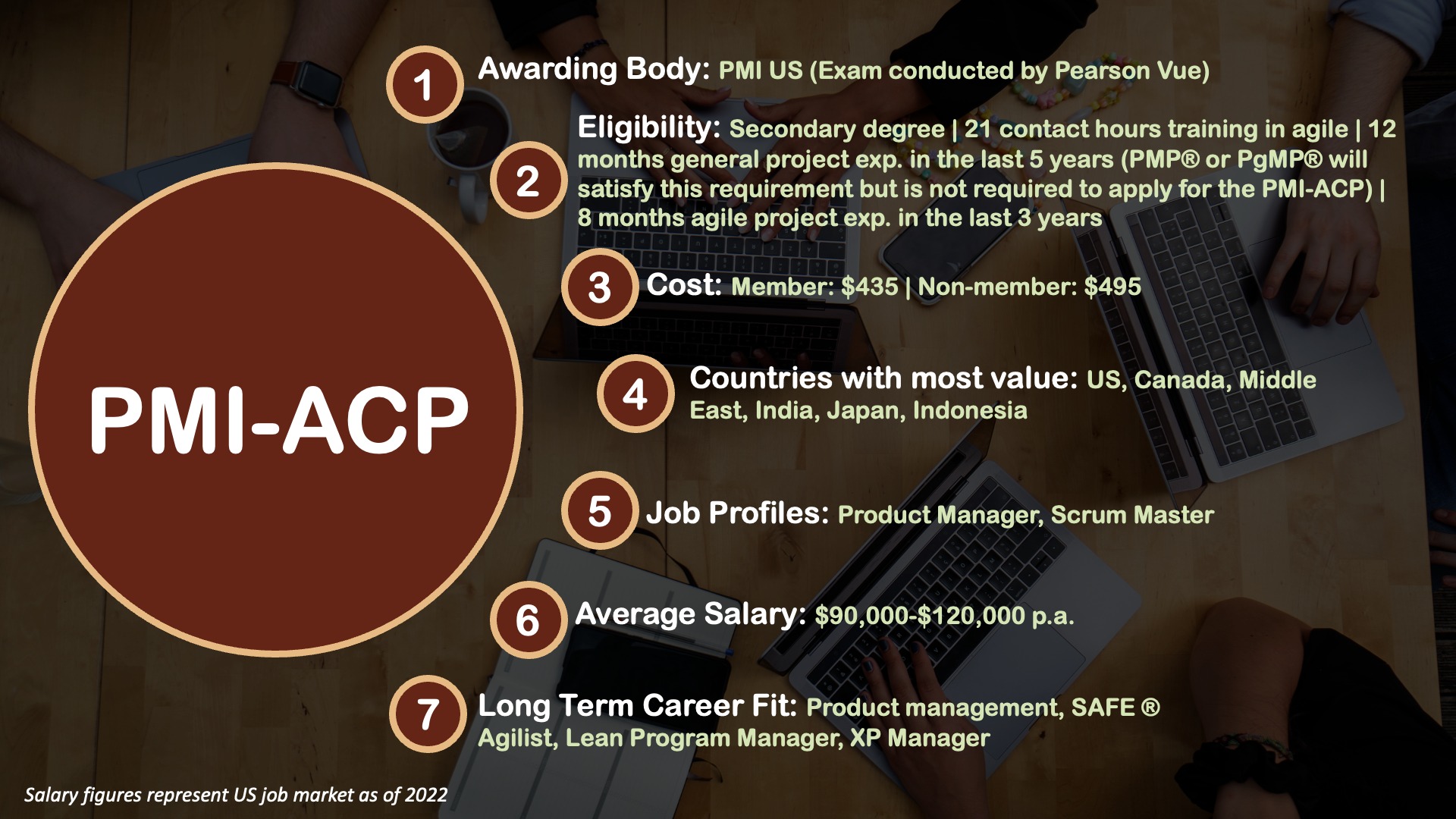

The infographic above highlights the most important items that you need to know if you are planning to pursue this certification. However, I would like to highlight a couple of important pointers related to the PMI-ACP Certification as below:
- If you study the job profiles in the infographic above, you will notice that the PMI-ACP is extremely valued in the information technology domain, so if you are from the manufacturing or civil or retail banking or logistics industry, then probably the PMI-ACP certification will not be very relevant for you (in this case, a PMP® Certification would make more sense). But, if you’re planning to get into IT project management and build a career around IT or Cloud Services then you should go for the PMI-ACP certification.
- In the long run, if you want to grow in IT project management you should consider getting other core IT-based certifications such as AWS, ITIL, MS Azure, SQL or Cisco certifications on top of the PMI ACP certification. A good idea would be to benchmark with your peers on LinkedIn to see what makes sense. As we mentioned in the very beginning, don’t pursue a certification just for the sake of it.
Check out the official PMI-ACP Certification webpage here and if you are planning to write the PMI-ACP Exam, you can check out my recommended courses on Udemy for PMI-ACP Certification training here.
PgMP/PfMP Certification:
The PgMP and PfMP certifications are similar in nature. PgMP stands for Program Management Professional and PfMP stands for Portfolio Management Professional. Essentially, PgMP and PfMP does NOT target to validate very different skill levels. So, both of them have similar eligibility, cost and industry relevance.
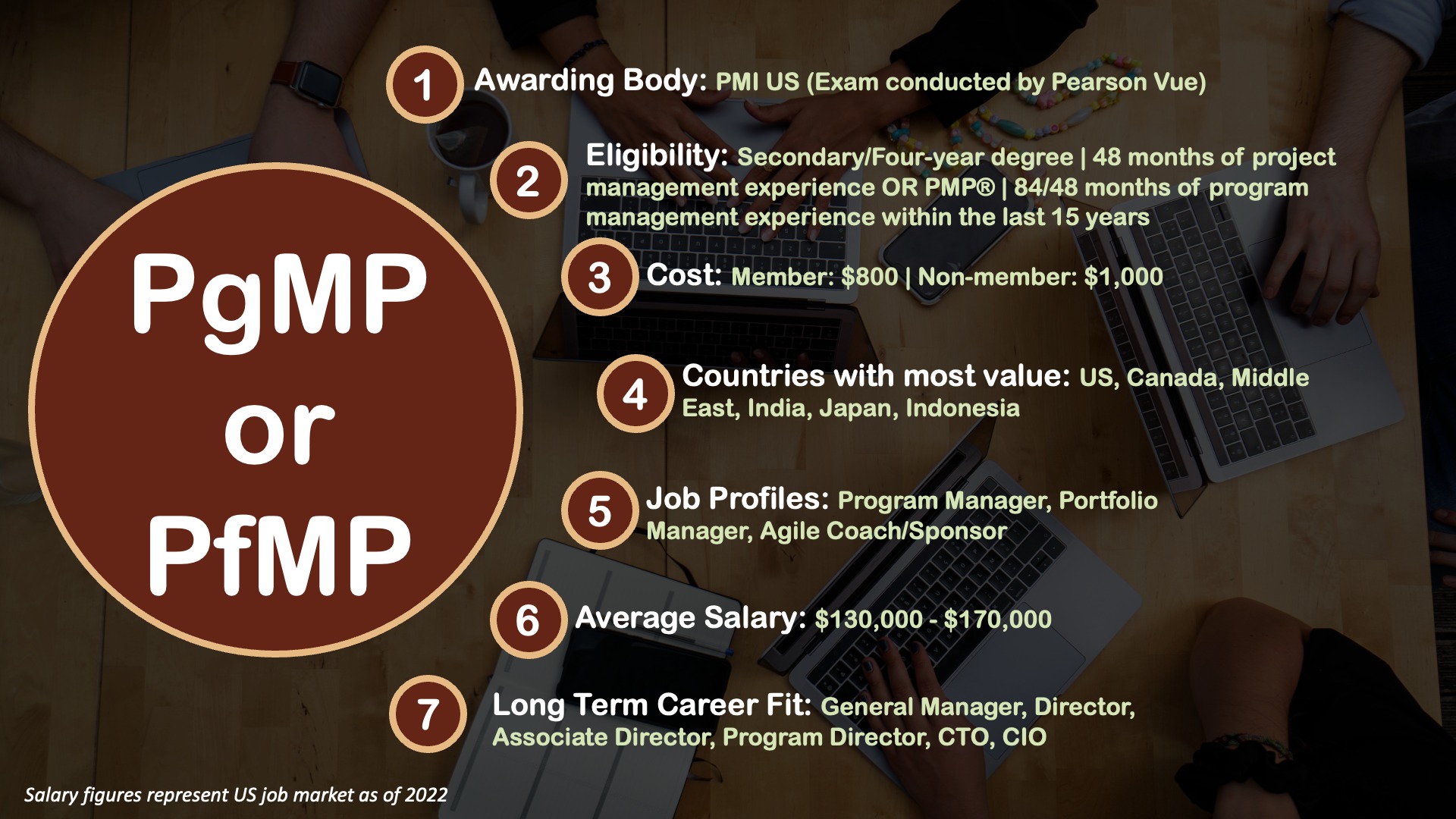

The infographic above highlights the most important items that you need to know if you are planning to pursue PgMP or PfMP certification.
However, you should think of taking up these certifications if you are already a PMP or a PMI-ACP or a PRINCE2 practitioner, and you are passionate about managing bigger scope of projects in terms of a program or portfolio for your organization.
You should keep in mind that the PgMP and PfMP certifications particularly help you a lot in your promotion or progression if you already hold the certifications such as PMP and PRINCE2. On top of this, you should also have a highly diversified experience in leading big teams (>50-60 members) spread across various geographies.
If you have or aspire for such kind of profiles, then PgMP and PfMP can be a major differentiator for you compared to your peers when it comes to promotion or an interview.
Therefore, please do not consider these certifications at the very early stages of your career as a project manager.
Please find the official website of PgMP Certification and official website of PfMP Certification here. Also, if you are planning to write the PgMP/PfMP Exam, you can check out my recommended courses on Udemy for PgMP Certification Exam training and recommended courses on Udemy for PfMP Exam Certification training here.
ITIL-v4 Certification:
A highly valued certification for professionals who want to build a career in project management, especially in the IT service industry of the US, Canada, UK, India and Australia is the ITIL version 4 certification.
The ITIL has three levels, the Foundation Level is the point of entry, then you can go for the Strategic or Specialist modules based on the profile you are working and finally you can get certified in the Mastery/Leadership module which is the highest level of certification in the ITIL hierarchy.
The following infographic captures the preliminary details regarding the ITIL-v4 Certification track. However, it is recommended that you study the official ITIL-v4 webpage if you are seriously considering getting into this track.
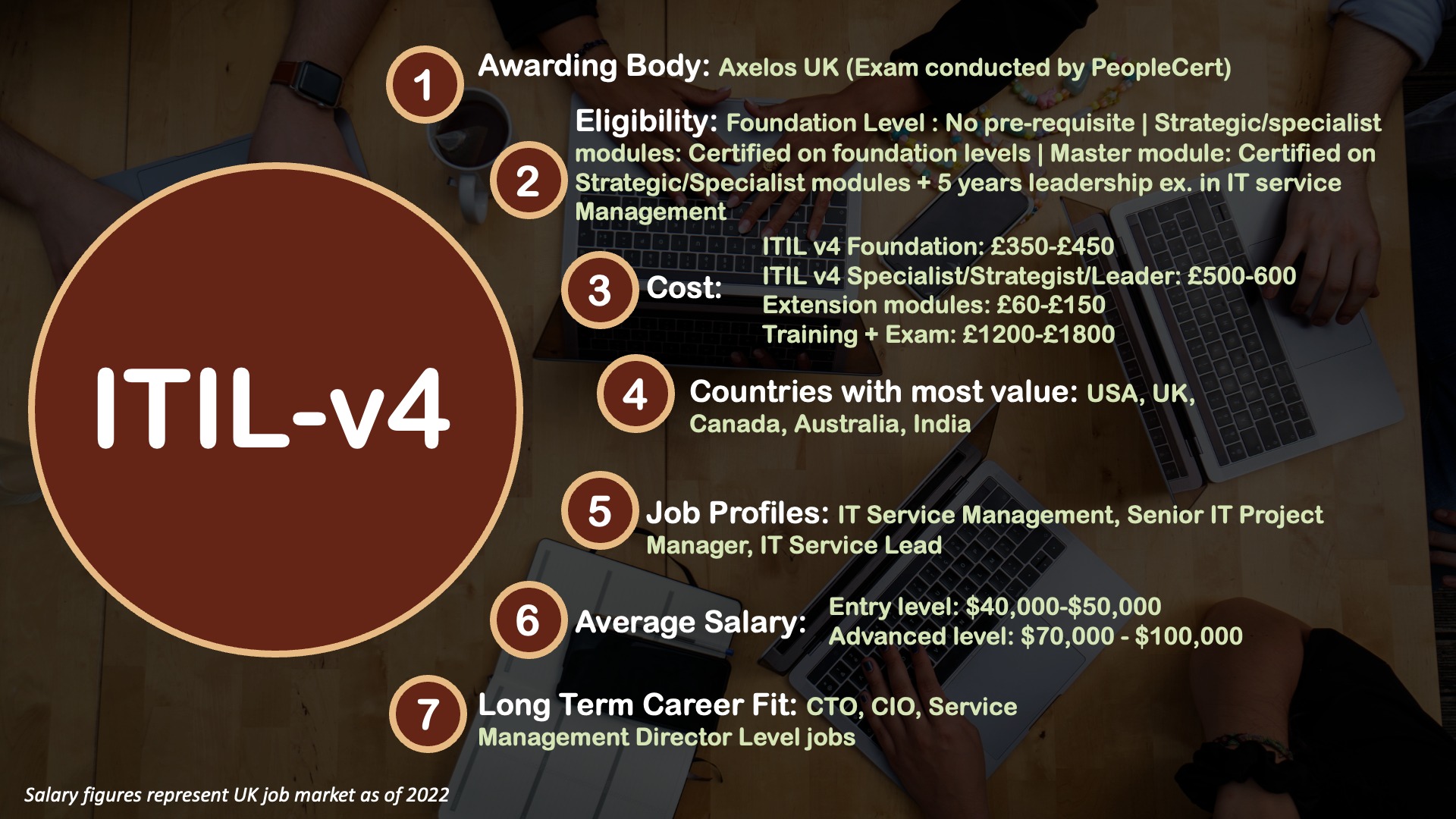

In the infographic above, if you study the job profiles, you’ll see that ITIL is highly focused on the IT service industry domain.
So if you’re into core IT Service Management in companies like Amazon, Cisco, Intel, IBM, TCS etc. you should consider getting this certification.
However, if you are more into the product development and network architecture domain of IT please consider other certifications such as the Certified Scrum Master or the PMI-ACP or the CompTIA certifications.
If you are planning to write the ITIL-v4 Exam, you can check out my recommended courses on Edureka for the ITIL-v4 Certification Exam here.
6. Fit of Project Management Certifications with Industry Domains:
To decide effectively which certification is best for project management, considering your career trajectory, you need to see the fit of the certification with the industry.
In the infographic below, you can see all the project management certifications that we have discussed above and in which industries they are valued in.
You can use this table to make an informed decision on which certification you should proceed with, to advance your career as a project manager of tomorrow.
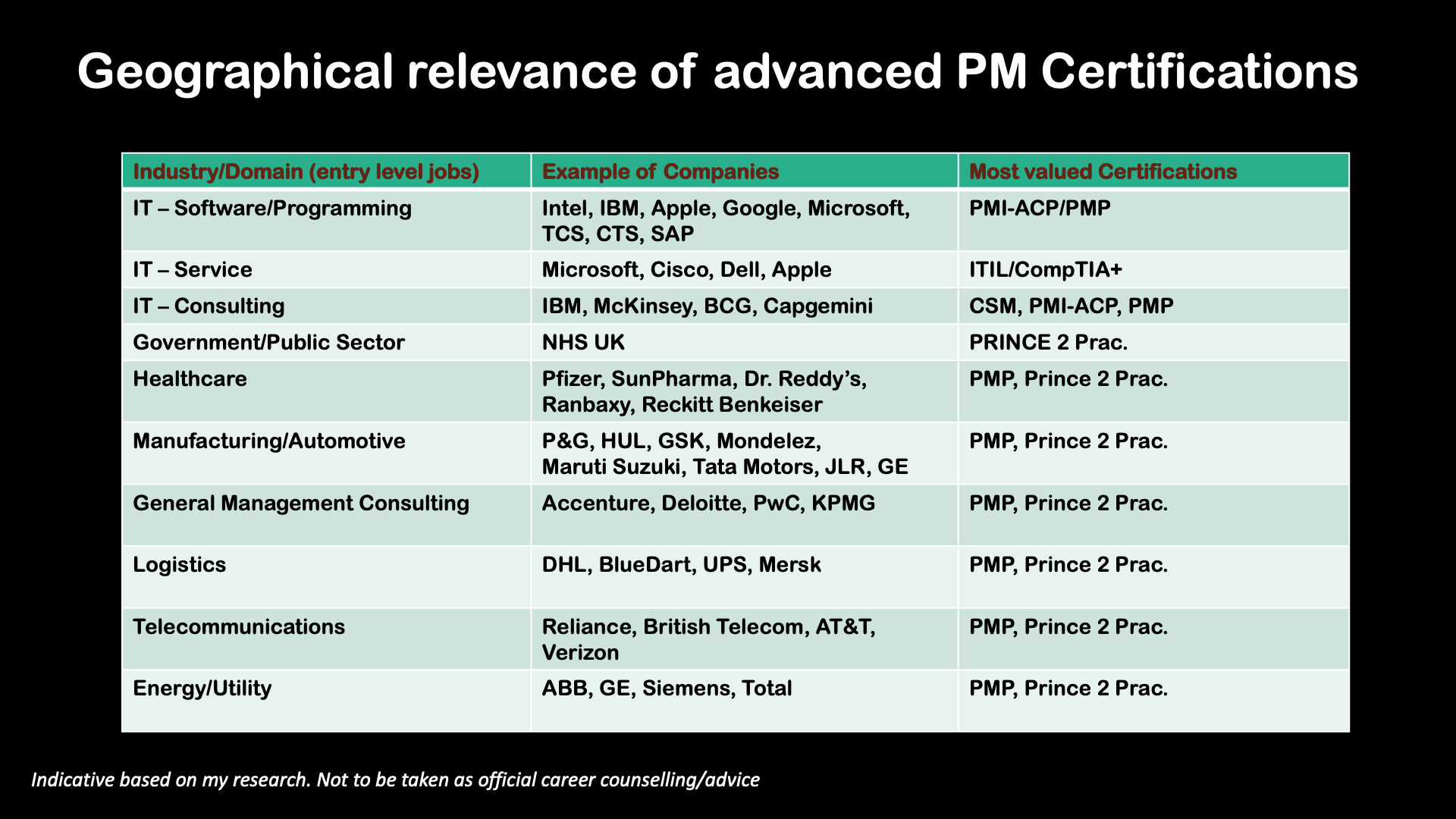

7. Fit of Project Management Certifications with Geographical Locations:
The infographic below shows you the project management certifications that are relevant in a particular geographical area. This would be extremely useful for you when you are deciding on which advanced level PM certification to pursue once you have found your feet in the project management industry.
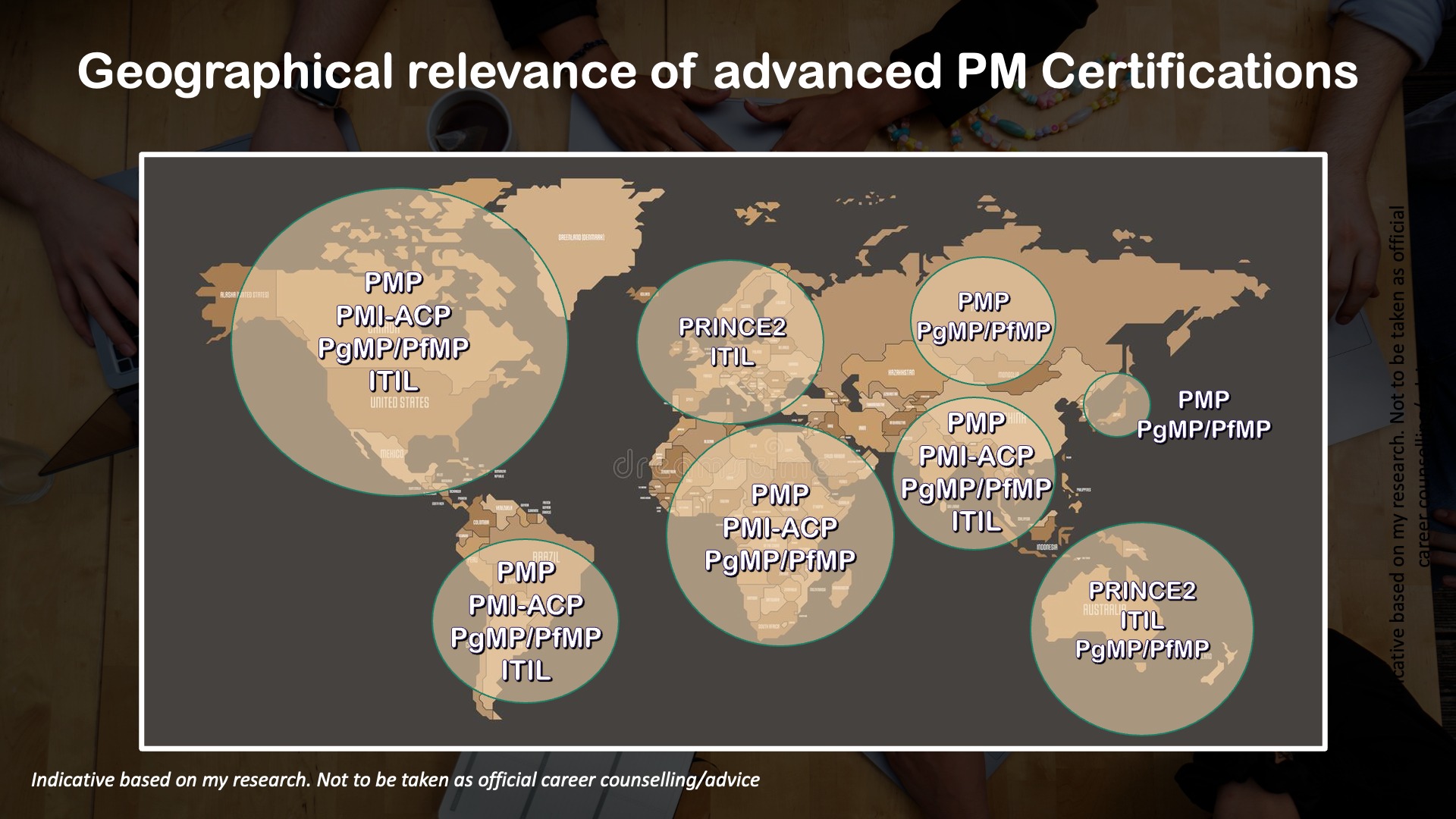

8. Conclusion – Project Management Certifications – Myth vs. Reality
As a project management professional, you should be aware of the most common myth which is: “if I do a certification, I will get a job”.
This is grossly incorrect.
You should remember that a ‘certification’ only does two things:
- Certifications provide you with the required knowledge that helps you to apply the best practices in real-life projects to deliver them successfully for your organization
- Certifications provide your CV with maximum chances to be shortlisted for an interview. So, if you have a PMP or a PRINCE2 or a PMI-ACP certification, the chances of your CV getting shortlisted for an interview increase dramatically
This is a lot compared to your peers who do not hold a certification, right? People spend days & months floating CVs across different job portals to get a shortlist or an interview call. Having an industry-relevant certification makes that job easier for you.
However, you should remember that only having certifications doesn’t help you ‘get’ a job. You still have to earn it by proving your mettle in the interview and providing the interviews with confidence that you are the right candidate. And communicating that ‘confidence’ will only come from real-life work experience and applying what you have learned through the certification process in actual projects. Remember, the interviewers are smarter than you and they would know when you piggyback on a project and when you actually do a project.
Hence, keep this in mind whenever you are pursuing any certification so that you understand the correct intent of having a certification as a professional in your CV.
Hope you enjoyed reading the article. If you are preparing for your PMP Exam, don’t forget to check out my Udemy Courses and Live PMP Masterclass Sessions as below:
The last one is the best if you are struggling to learn EVM during your PMP and CAPM preparation.
Cheers and I will talk to you soon!
Ray

